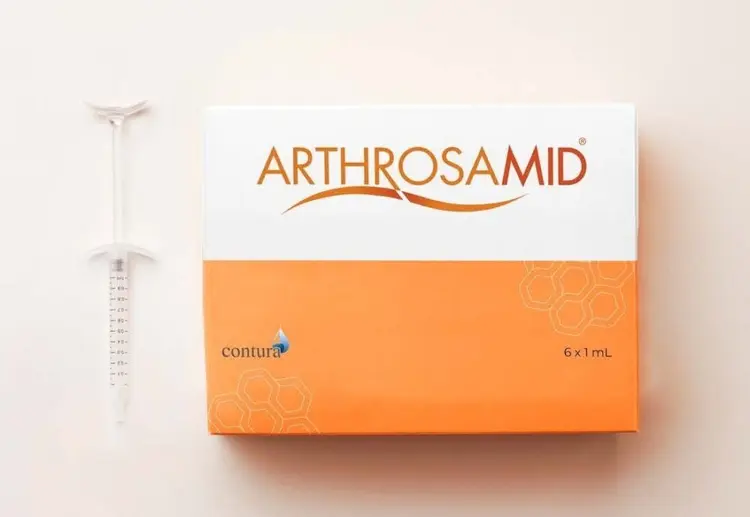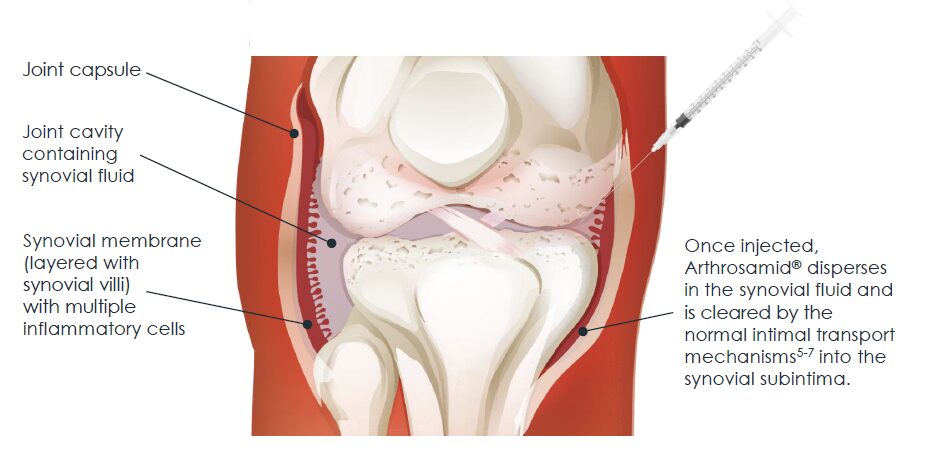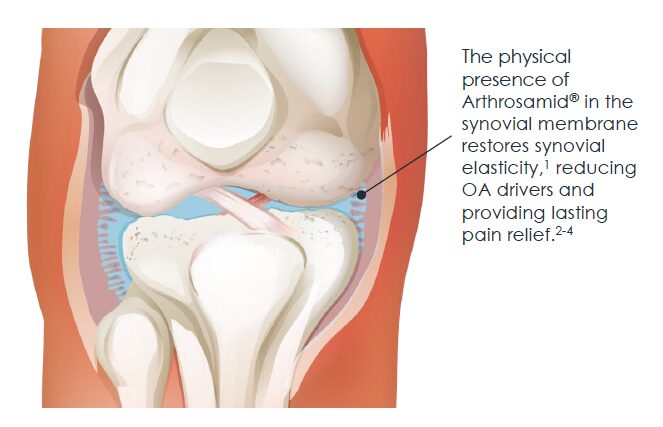


A single-injection, non-biodegradable hydrogel treatment designed to provide lasting relief from knee pain — without the need for surgery.
Arthrosamid® is an innovative non-biodegradable hydrogel technology. It is a 2.5% cross-linked polyacrylamide and 97.5% water, specifically developed to treat the symptoms of knee osteoarthritis.
Unlike traditional treatments that are absorbed by the body, Arthrosamid® integrates into the synovial tissue of the joint capsule, offering a permanent cushioning effect that reduces pain and improves mobility.

"A revolutionary treatment in managing knee health."
Once Injected, Arthrosamid® disperses in the synovial fluid and is cleared by the normal intimal transport mechanisms into the synovial subintima.

The physical presence of Arthrosamid® in the synovial membrane restores synovial elasticity, reducing OA drivers and providing lasting pain relief.

Supported by more than two decades of research, Arthrosamid® is proven to be safe and effective for long-term pain relief.
Arthrosamid® is designed to provide significant pain reduction that lasts for years, not just months like HA injections.
A simple, one-step procedure performed under local anesthesia by a qualified physician—without hospital stays.
We guide you through every step of the process to ensure the best possible outcome for your mobility and comfort.
Speak with our specialist to determine if Arthrosamid is the right solution for your specific knee condition.
A single injection performed in-clinic under local and anesthesia and ultrasound guidance. The process typically takes less than 30 minutes.
Return home the same day. Most patients can resume normal daily activities within 24 to 48 hours.
Experience a gradual reduction in pain and stiffness over the coming weeks, lasting for years.
Polyacrylamide does not degrade and can provide significant relief for up to 5 years. Patients typically begin to experience pain relief within 4-12 weeks.
Repeat injections can be performed indefinitely.
Any patient with an active infection (body-wide or near injection site) or a recent knee arthroscopy within the last 6 months should not undergo this treatment.
You will be prescribed antibiotics prior to your procedure. Please ensure you take these 1-6 hours before the injection to avoid potential infection.
If you are scheduled to have a surgical or dental procedure in the future, you should tell the treating doctor that you have a permanent hydrogel implant as this may require prophylactic antibiotic therapy.
For most injections, people can drive afterwards. Nonetheless, bringing a driver is always a good idea just in case. We ask all patients to remain in the clinic waiting room for a minimum of 15 minutes afterwards to observe for any adverse reactions.
This depends on the type of sport and intensity, but we generally recommend taking it easy for 2 days as post-injection flares may occur. If steroid was provided, this takes effect after day 2. Overall, please be mindful with anything you do and listen to your body.
Please see our fees and financing or contact us for more information.
Book a consultation at The Ability Clinic today and find out if Arthrosamid® is the right choice for your knee health.
REHABILITATION SERVICES
Unit 303: Physiotherapy, Massage Therapy,
Chiropractic, Custom Bracing, DEXA Body Scans
Mon, Wed, Fri : 8 am to 7 pm
Tues, Thurs : 8 am to 5 pm
Sat to Sun : Closed
MEDICAL SERVICES
Unit 303: Rheumatology, Neurology, Psychiatry, Lifestyle Medicine
Unit 304: Physical Medicine, NCS/EMG, US-Guided Injections
Mon to Fri : 8 am to 5 pm
Sat to Sun : Closed
(Hours and availability may vary)